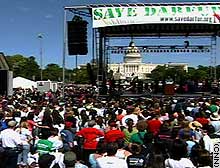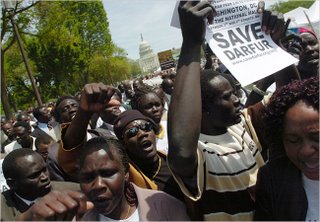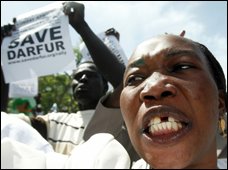
On August 28, 1963, a crowd of 350,000 Americans flooded the National Mall to participate in the historic March on Washington for Jobs and Freedom, where Dr. Martin Luther King Jr. delivered his iconic "I Have a Dream" speech. Six years later on November 15th, 1969, over 500,000 protestors rallied together on the Mall to denounce the Vietnam War. And in 1987, half of a million gay men and women gathered to demand equal rights.
Since 1894, over twenty protest marches have taken place on the National Mall, with most of them attracting crowds that numbered in the hundreds of thousands. Thus compared to its predecessors, the Rally to End Genocide (which took place on Sunday) was a small-town gathering. The JTA gave an estimate of 75,000 partipants while The Washington Post tallied a mere 10-15,000. Nevertheless, the rally, which was held beneath the towering height of the Capitol, was a success. Whereas protests for civil and gay rights attract a relatively homogeneous crowd, the Rally to End Genocide attracted a spectrum of American and international participants.
The first participants I met were three high school girls from New York City who came down with their local JCC. My friend Lauren met an elderly woman who came to the rally with her synagogue. Participants hailed from Boston, Philadelphia, and Portland, Maine. Some people drove all night from Atlanta; others flew from Seattle. Parents brought their children; teenagers brought their parents; grandparents came with other grandparents.
 I saw white faces and black ones, Asians and Indians. I encountered Jews, Muslims, and Christians. I even chatted for a few minutes with one of my friends from BYU---a Utah boy who was spending his Sabbath protesting for Darfur.
I saw white faces and black ones, Asians and Indians. I encountered Jews, Muslims, and Christians. I even chatted for a few minutes with one of my friends from BYU---a Utah boy who was spending his Sabbath protesting for Darfur.My fellow volunteers were an eclectic bunch. One of my favorite volunteers was Steve Orrison, who worked for NATO for eighteen years and who was married to a French woman (who was also volunteering at the rally). Both of them were in their sixties. And even though Steve has back problems, he spent the entire day lifting and carrying boxes, working from nine in the morning well into the evening.
Then there was Samantha, a rail-thin blonde who was a freshman at George Washington University. There was Lauren, a graduate of Penn who worked in micro-finance. There was an African-American teacher who lived in New York City during 9/11. There was a seventy-year old man who had a long white moustache and wore a cowboy hat.
Many volunteers were recent graduates who now work in the non-profit world. I felt a kinship with them, even though they majored in international relations or public health when they were in college. I think a lot of us dreamt of saving the world after graduation, building huts in Peru or teaching English in Africa. But I guess the logistics of the "real world" eventually burst our bubble, making us realize that we can't save the world on $30,000 a year. We worked hard at the rally---lifting boxes, unloading trucks, selling merchandise, policing the crowd, picking up trash. We put our hearts into what we did because, sadly, this was all we could do. No matter how loudly we shouted for help to save the refugees in Darfur, we needed the government's help to bring this tragedy to an end.
We worked hard at the rally---lifting boxes, unloading trucks, selling merchandise, policing the crowd, picking up trash. We put our hearts into what we did because, sadly, this was all we could do. No matter how loudly we shouted for help to save the refugees in Darfur, we needed the government's help to bring this tragedy to an end. And so when the rally concluded, I felt a sense of hopelessness. Sure, I spent the entire day as a volunteer, but was that enough? Could a little rally in Washington, D.C. salvage the lives of millions of Sudanese refugees? Would the rally cause the government to take more political action in Darfur?
The lesson I learned is this: no matter how hoarse our voices become, we need to keep shouting for help. We may not be able to end the genocide in Darfur, but that doesn't mean we should do nothing. Apathy is our greatest enemy. As long as the genocide ensues, I will continue to volunteer at the Save Darfur Coalition. In the end, we may fail and we may fail miserably. But our time will not have been wasted. A worthy cause is never a waste. Hope is never a waste.
Again, we may fail, but there is also a slim chance that we may succeed. Today, President Bush urged the president of Sudan to bring peace to Darfur. Our hope has brought us this far; and I can only hope that it will bring us even farther.
